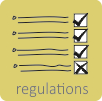Integrated Energy Policy has placed heavy emphasis on energy efficiency and conservation, with particular focus on efficiency of electricity generation, transmission, distribution and end-use. Specifically for the building sector, following areas have been identified where significant energy savings can be achieved:
- Electricity generation, transmission and distribution;
- Water pumping;
- Building design;
- Construction;
- Heating, ventilation and air conditioning;
- Lighting;
- Household appliances.
The policy recommends awards, incentives, penalties, regulatory energy efficiency programs, and awareness programs to guarantee the successful adoption of energy efficiency measures in these sectors.
Recommended initiatives
-
- Benchmarking (minimum energy consumption and best practices) for buildings and industries.
- Revision of procurement policies for equipment and products in public buildings from lowest initial cost to minimum annualised life cycle cost.
- Implementation of time of day (TOD) tariff.
- Grid interconnection for cogeneration.
- Strengthening of labeling scheme for equipment and appliances.
- Energy efficiency programs for lighting, pumps, motors, solar hot water systems and other equipment.
- Daylight saving time.
- Compulsory Energy audits for facilities with more than 1 MW load.
- Financial and regulatory support for energy service companies (ESCOs).
- Provision for allowing utilities to factor cost of energy efficiency infrastructure in tariffs.
Recommendations for robust institutional framework
-
- Testing laboratories for efficient equipment.
- Independent third party verification systems.
- Energy efficiency/ demand side management cells at utilities.












